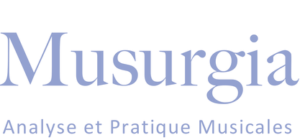NICOLAS, PATRICE, « L’AMPHIBIE » DE FRANÇOIS COUPERIN OU ABRÉGÉ DES LIEUX COMMUNS LES PLUS UTILES POUR L’IMPROVISATION ET LA COMPOSITION, MUSURGIA, 27/4 (2020)
Auteur: Nicolas, Patrice
Titre: « L’Amphibie » de François Couperin ou Abrégé des lieux communs les plus utiles pour l’improvisation et la composition
Pagination: 11-39
Langue de l’article: Français
Résumé français:
Depuis la parution, en 2007, de l’ouvrage clé Music in the Galant Style de Robert Gjerdingen, l’improvisation musicale historiquement informée n’a pas cessé de gagner en importance. L’on comprend mieux, maintenant, comment les anciens musiciens pouvaient produire quantité d’œuvres de la plus haute qualité, et ce avec une rapidité et une facilité qu’il paraissait jusque-là impossible d’atteindre. Leur secret réside dans un enseignement fondé sur la pratique séculaire du lieu commun, dont on peut se faire une idée d’après les traités théoriques qui nous sont parvenus. Pour ce qui est de la pratique française du xviiie siècle, il nous manque cependant celui de François Couperin, qui viendrait compléter la trop brève Règle pour l’accompagnement non autographe qui lui est attribuée. Comment donc Couperin instruisait-il plus complètement ses apprentis dans l’art de préluder et quels lieux communs jugeait-il comme étant les plus utiles pour l’improvisation et la composition ? Une de ses œuvres, aussi remarquable que singulière, « L’Amphibie », pourrait bien nous fournir quelques éléments de réponse.
Résumé anglais:
Since Robert Gjerdingen’s 2007 ground-breaking book Music in the Galant Style, historically informed musical improvisation has considerably grown in importance. We now have a better understanding of how early musicians produced so many high-quality works, and with a speed and facility that had previously seemed impossible to attain. Their secret lies in a long-established pedagogical tradition grounded in the practice of the commonplace, of which we can get an understanding from the theoretical treatises that have come down to us. As far as the eighteenth-century French practice is concerned, however, we lack François Couperin’s treatise which would complete the non-autograph and far too brief manuscript of the Règle pour l’accompagnement attributed to him. How then did Couperin fully instruct his apprentices in the art of preluding, and what commonplaces did he consider to be the most useful for improvisation and composition? One of his works, as remarkable as it is singular, « L’Amphibie », could very well provide us with some answers.
Appartient au volume: 27/4 (2020)
